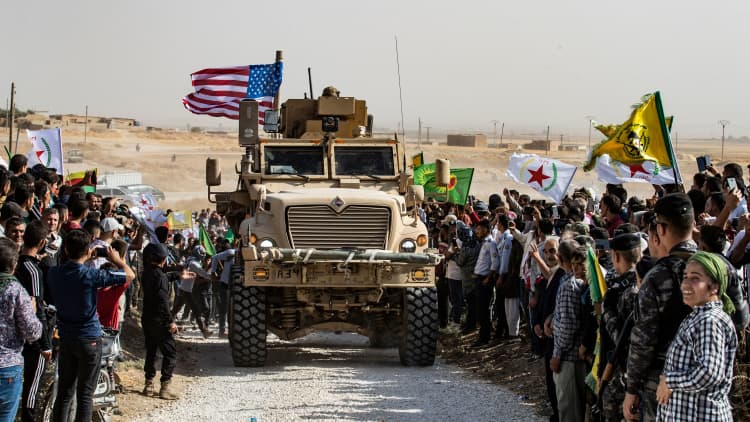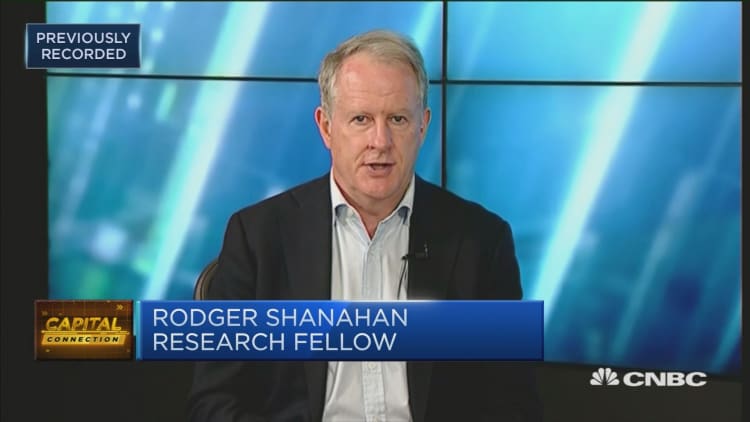
The Trump administration is facing a torrent of criticism Monday after it unexpectedly announced a full U.S. troop withdrawal from northern Syria to effectively allow a long-planned military operation by Turkey against Kurdish ground forces, who had battled to uproot ISIS.
"Turkey will soon be moving forward with its long-planned operation into Northern Syria," a White House statement late Sunday said, noting that President Donald Trump had spoken to his Turkish counterpart Recep Tayyip Erdogan by phone. "The United States Armed Forces will not support or be involved in the operation, and United States forces, having defeated the ISIS territorial 'Caliphate,' will no longer be in the immediate area."
Security experts on the region and former U.S. officials are calling the decision harmful and a gift to America's adversaries, while some members of the Kurdish forces on the ground in Syria are calling it betrayal.
"The WH statement tonight on Syria after Trump spoke with Erdogan demonstrates a complete lack of understanding of anything happening on the ground," Brett McGurk, the former U.S. special envoy to the global anti-IS coalition, said Monday on Twitter.
"Trump tonight after one call with a foreign leader provided a gift to Russia, Iran, and ISIS."
Syria's bloody 8-year long conflict has seen military intervention by numerous world powers including Russia and Iran, without whose help Syrian dictator Bashar al Assad wouldn't have survived, regional experts say. Washington and Moscow have long condemned each other's involvement in the country, and the U.S. currently imposes sanctions on Russia for its support of Assad.
McGurk resigned from his position in December after Trump's shock announcement that the U.S. would withdraw all its forces from Syria, a move that meant abandoning U.S.-allied Kurdish troops who proved vital in the defeat of the so-called Islamic State's caliphate. Trump later walked back the decision after widespread condemnation from Republicans and Democrats, giving the impression that several thousand U.S. troops would remain in the region to assist its local allies.
All the sacrifices we made to defeat ISIS will all be destroyed with the latest American decision. It seems that the policy of the United States is to betray their friends and allies.Mustafa BaliSyrian Democratic Forces
The administration says this change means Turkey will take over responsibility for all the IS fighters captured in the region, currently being held primarily by the U.S.-backed Syrian Democratic Forces, the anti-IS strike force composed mainly of Kurdish fighters.
But critics describe the Turkish operation as an invasion aimed at attacking the Kurdish forces. The SDF, created with U.S. backing in 2015, is militarily led by the Kurdish People's Protection Units, or YPG, a group Ankara views as terrorists and a security threat on its southern border. The Turks stress the YPG's ties to a separatist Kurdish group in Turkey, the PKK, which has carried out a decades-long violent insurgency against the Turkish state.
NATO ally Turkey vs. US allies in Syria
Turkey has made no secret of its planned targeting of Kurdish fighters in the past.
In January, Turkey said it would go ahead with its military offensive against Kurdish militias in northeastern Syria regardless of whether the U.S. withdraws its troops from the country. Ankara has already amassed thousands of Turkish troops along its border with Syria.
Days later, Trump warned Turkey, a NATO ally, it could face devastating sanctions if it attacked Kurds after U.S. troops pull out of Syria.
The latest statement from the White House made no mention of the sanctions, and only said: "Turkey will now be responsible for all ISIS fighters in the area captured over the past two years in the wake of the defeat of the territorial 'Caliphate' by the United States."
A dramatic turnaround — and a 'betrayal'?
The apparent hands-off approach from Washington signifies a sharp turnaround in Trump's position, which earlier this year seemed to hold to the conventional U.S. policy of supporting the Kurdish-led Syrian Democratic Forces, who suffered heavy losses in the fight against IS.
For many Kurdish fighters on the ground, the move feels like a betrayal.
One Syrian Kurdish official told NBC News, reacting to Trump's overnight decision: "The Americans are traitors. They have abandoned us to a Turkish massacre. We can no longer fight against ISIS and have to defend ourselves. This could allow ISIS to return to the region."
SDF spokesman Mustafa Bali called the decision "shocking and unexpected, accusing Washington of letting the area "turn into a war zone," adding that the SDF would "defend north-east Syria at all costs."
"We at the SDF believe that everything we achieved in the last five years, and all the sacrifices we made to defeat ISIS will all be destroyed with the latest American decision," he said. "It seems that the policy of the United States is to betray their friends and allies."

McGurk, in a scathing Twitter thread, called Trump's decision "impulsive" and "reckless," pointing out the risks tied to entrusting Ankara with containing tens of thousands of detained IS fighters.
"Turkey has neither the intent, desire, nor capacity to manage 60k detainees in al Hol camp, which State and DoD IGs warn is the nucleus for a resurgent ISIS. Believing otherwise is a reckless gamble with our national security," he said.
"The 'United States' is not holding any ISIS detainees," McGurk continued, referencing the White House statement. "They are all being held by the SDF, which Trump just served up to Turkey."
Charles Lister, director of the Countering Terrorism and Extremism Program at the Middle East Institute with years of experience negotiating with Syrian opposition groups, said on Twitter:
"For U.S foreign policy, Donald Trump has been the worst negotiator out there. He cedes tactical & strategic leverage at critical negotiation points, thereby crippling the value of his broader investments."
"The damage to long-term U.S interests could be approaching irreversible."
CNBC has reached out to the White House for comment.


